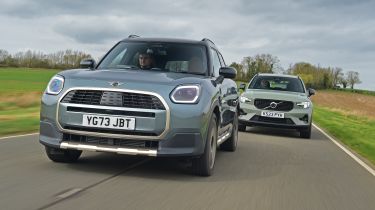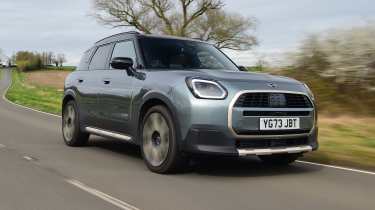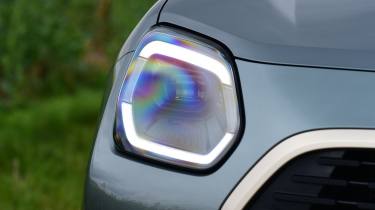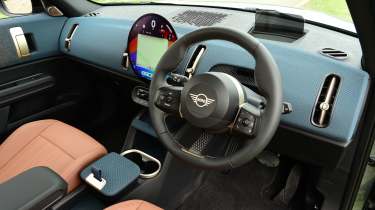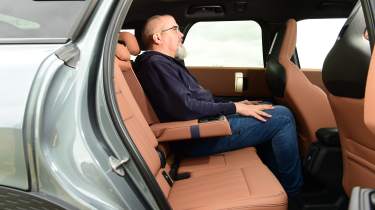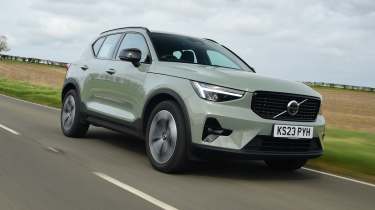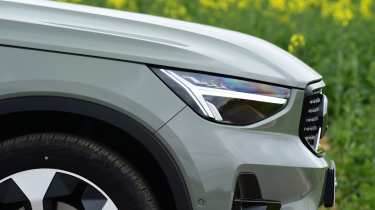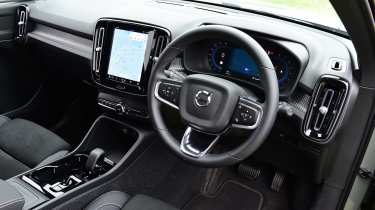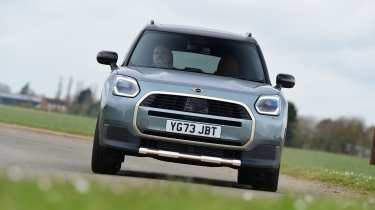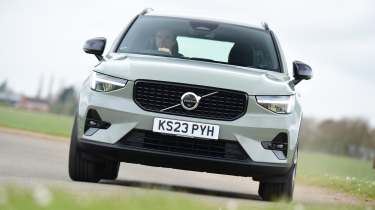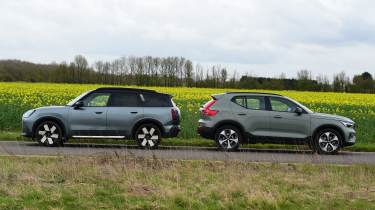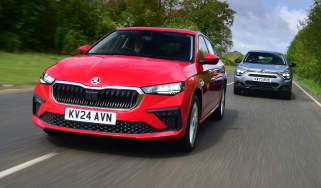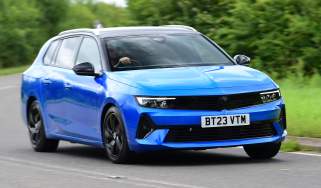Volvo XC40 vs MINI Countryman 2024 twin test: a small SUV skirmish
The MINI Countryman is now a big hitter in the premium compact SUV class, but can it beat the Volvo XC40?
There’s no doubt that the MINI Countryman has been perceived by critics as the complete antithesis of the original Mini’s philosophy, but there’s no arguing with the sales figures. The SUV’s combination of style and space has been very popular with buyers, and in a bid to tap into that market even further, MINI has gone all out with the latest Countryman to produce the company’s biggest model yet.
The third generation introduces all-electric drive to the line-up for the first time, but for this test we’re trying the 1.5-litre petrol mild-hybrid variant, which offers a balanced combination of performance and efficiency at a price that represents decent value in lower specs.
But with an increase in size comes a move into a more premium area of the SUV market, so we’ve lined the Countryman up against another model that offers a mix of style and practicality: the Volvo XC40.
Recent range revisions now mean that the petrol and electric versions of Volvo’s smallest SUV trade under different names. But with similar dimensions, power and equipment to the MINI, the B3 petrol model should be a close contender in this contest.
| MINI Countryman C Exclusive Level 3 | Volvo XC40 B3 Plus | |
| Price: | £39,350 | £39,810 |
| Powertrain: | 1.5-litre 3cyl turbo petrol, 168bhp | 2.0-litre 4cyl turbo petrol, 161bhp |
| 0-62mph: | 8.3 seconds | 8.6 seconds |
| Test efficiency: | 40.4mpg/8.9mpl | 41.5mpg/9.1mpl |
| CO2: | 138g/km | 150g/km |
MINI Countryman
The third-generation MINI Countryman is bigger than the outgoing car in every dimension, but prices have remained largely the same. The range kicks off from £29,335, but there are plenty of ways to increase this. Here we’re testing the Countryman C in Exclusive spec and with the £7,500 Level 3 option package, which bumps the price up to £39,350.
Tech highlights
The Countryman is larger than ever, but it’s still built on the BMW Group’s UKL2 platform, which was also used by its predecessor. However, MINI has maximised the car’s dimensions, and the new model is 147mm longer, 21mm wider and 104mm taller than before, with a wheelbase stretched by 22mm. At 1,661mm, the newcomer also sits taller than the BMW X1 that uses the same platform.
Power for the Countryman C comes from a 1.5-litre three-cylinder turbo petrol mild-hybrid system that is connected to a seven-speed twin-clutch automatic gearbox. This sends 168bhp to the front wheels; if you want four-wheel drive, then you’ll have to upgrade to one of the 2.0-litre-engined S or John Cooper Works models.
Outside, the Countryman adds a squared-off theme to MINI’s familiar styling cues, and mixes them with boxy proportions that are reminiscent of a Land Rover. From the rear there are hints of MINI’s cross-country rally cars, while the tail-
lights feature a stylised version of the Union Flag LEDs first seen on the last MINI hatch.
Safety: The Countryman has yet to be tested by Euro NCAP, but it comes with the latest safety kit, including a speed-limit warning that automatically turns on every time you start the car. It’s easily deactivated via a shortcut button on the dashboard that calls up a menu on the touchscreen.
On the road
The Countryman offers good comfort at all speeds, but the slow-witted gearbox puts a dampener on any potential for driving fun.
Around town: While the Countryman is bigger than ever, its tall driving position and short overhangs mean it’s easy to position on the road. The steering is quick – perhaps a little too fast for such a tall car – and small inputs see the car dart
in your chosen direction. The suspension is firm, but not harsh enough to be uncomfortable.
Unfortunately the 168bhp engine is let down by the MINI’s standard-fit automatic gearbox. The transmission is very hesitant when accelerating, so you have to give yourself a bigger gap when entering a roundabout to ensure the powertrain has enough time to respond.
A & B-roads: Twisty roads are happy hunting grounds for MINI’s smaller models, but the Countryman’s growth spurt means it’s not really a car that you’d drive just for the fun of it. There are eight ‘Experiences’ available that adjust various settings (mainly the cabin ambience), but Go Kart mode sharpens the throttle response. However, this just emphasises the soft suspension that pitches the car back on its springs as you accelerate.
The gearbox also hampers any driving fun. While its responses are better once you’re up to speed, and the shifts are smooth, too, an absence of manual control – either via a lever or steering wheel paddles – means you’re left at the mercy of the car’s electronics at all times.
Motorway: The Countryman’s ride is still firm but more forgiving at higher speeds, and it’s a fairly relaxed cruiser. There is some wind noise from the door mirrors, but it’s not a deal breaker.
Ownership
What the MINI Countryman lacks in terms of driving pizazz it more than makes up for with its style-led interior. The large circular touchscreen in the centre of the dashboard is the focal point of the cabin, and while its design is inspired by the central speedo found in the earliest Minis, its tech and features are bang up to date.
All but the most essential controls are contained within the touchscreen, but it’s easy enough to get along with, thanks to its sheer size; at around 10 inches in diameter, it’s only four inches smaller than the car’s steering wheel.
Elsewhere the interior has a premium feel, with the car’s black plastic reserved for the lower sections of the cabin. Adding the Exclusive style pack introduces blue fabric dashboard trim that merges into a beige finish on the doors, while the synthetic-leather upholstery comes in beige, dark blue or cream. If black is more your style, the standard Countryman C has part-fabric black upholstery, while the Sport style pack features traditional black upholstery with red stitching.
At night, LED lighting projects patterns across the dashboard, and these change with the eight preset Experiences on offer. Core has a blue theme to match Exclusive trim’s colours, a racy black and red Go Kart setting, plus retro, off-road and relaxing themes. Whichever finish and setting you choose, you won’t be disappointed by the amount of space inside, with lots of head and elbow room up front and a wide range of seat adjustment.
Storage: There are plenty of neat storage solutions, too. The wireless charging tray is big enough for most smartphones, and angled so your device won’t fall out. There are large door bins front and rear with deep sides, and a good glovebox, but there’s no under-armrest bin. Instead, you get a large open tray with a storage box ahead of it and a pair of decent cup-holders.
Practicality
The latest Countryman is the roomiest and most versatile MINI ever built.
Rear Space: A light-coloured cabin helps with the MINI’s sense of spaciousness, but it doesn’t need it because it’s genuinely roomy in the back. There’s lots of elbow and shoulder room, while foot space is boosted for the middle-seat passenger with a cutout beneath the central armrest up front. The seat backs recline in steps for added comfort, while the chairs slide back and forth to boost legroom or boot space as needed.
Boot: A powered tailgate is standard, and it opens to reveal a square cargo area with flat sides. The floor is slightly below the level of the boot lip to stop items falling out, while lifting it reveals a deep hidden storage compartment beneath. As well as a sliding rear bench, the seat backs fold in a 40:20:40 split for even greater versatility.
What to buy?
Which version we’d choose…
- Powertrains: There are five options for the Countryman: the 1.5 turbo three-cylinder tested here, a 2.0-litre turbo four with 215bhp in the S model or 296bhp for the John Cooper Works – both of which come with ALL4 four-wheel drive – and two electric versions with 201bhp or 309bhp, the latter also being an ALL4 model. All cars are autos.
- Trim: The basic specs are C, S, JCW, E and SE, but there are ‘style’ upgrades. Classic is standard, while Exclusive and Sport versions cost extra. On top of that are Level 1, 2 and 3 option packs, which need to be added if you want specific extras.
- Our choice: The C Exclusive with Level 1 pack offers a good mix of style, tech and value.
Volvo XC40
The Volvo XC40 range has seen a reshuffle for 2024, with the electric versions separated from the combustion-engined line-up as two distinct models. What you’re left with is the petrol version tested here, which has prices that are on a par with the Countryman’s. This mid-range Plus model powered by the entry-level B3 petrol comes in at £39,810.
Tech highlights
While the Countryman is the biggest-ever MINI, the XC40 held the title of Volvo’s smallest SUV until the EX30 was launched earlier this year.
On paper the XC40 is slightly shorter and lower than the MINI, but it has a longer wheelbase and is wider, too. However, the car’s packaging isn’t quite as well thought out as its rival’s, so there’s not as much space in the back seats.
Power comes from a 2.0-litre turbocharged four-cylinder engine, which makes 161bhp and 265Nm of torque, figures which are 7bhp and 15Nm behind the MINI respectively. However, a 0-62mph time of 8.6 seconds is only 0.3 seconds behind the Countryman’s, so performance feels similar from behind the wheel.
The XC40 was the first Volvo to use the company’s CMA platform, which has since been used by the electric EC40 (formerly C40), the Polestar 2 and models from Lynk & Co and Volvo’s parent firm Geely. It uses MacPherson struts up front and a multi-link suspension system at the rear, a configuration that is also adopted by the Countryman.
Safety: The XC40 was tested by Euro NCAP in 2018, when it earned a five-star rating and the highest percentage scores of any car tested that year. However, the test body’s ratings are only valid for six years, so the XC40 will need to be re-tested to keep its star rating.
On the road
As with the MINI, the Volvo focuses on comfort and refinement ahead of handling agility.
Around town: A tall driving position provides a clear view of your surroundings in the Volvo, while light steering means it’s easy to manoeuvre. The ride is reasonable at low speeds, our car helped by its 19-inch wheels, compared with the slightly firmer edge the MINI had on 20-inch rims. There’s less of a thump when hitting potholes, too.
One common trait between these two cars is a slow gearbox. The Volvo’s seven-speed unit isn’t quite as reluctant to respond as the MINI’s, but it still takes its time when selecting ratios.
A & B-roads: At higher speeds the Volvo majors on comfort ahead of engagement. There’s not much feedback from the steering, but the wheel is well weighted and the XC40 is composed when changing direction. A slower rack than the MINI’s means it’s more in tune with the Volvo’s character.
Unlike the MINI, the XC40 offers manual control of the gearbox, but it’s still not the most useful of systems. There are no steering wheel paddles, but the drive selector on the centre console can be used. However, it operates from side to side, so you push to the left to shift up and to the right to change down. It’s not very intuitive.
Thanks to the four-cylinder petrol engine, the Volvo sounds smoother than the MINI, and with maximum torque available from as low as 1,500rpm, there’s no real need to extend it.
Motorway: The Volvo is a relaxing car to drive at the national limit, thanks to its comfortable seats and a softer ride than the MINI’s. The suspension is softer, too, so cruising comfort is great, while road and wind noise are kept to a minimum.
Ownership
When the XC40 was launched, its minimalist, style-driven cabin was seen as a breath of fresh air, but compared with the latest MINI Countryman, it looks pretty ordinary. Our Volvo’s black interior trim and seats with microfibre and synthetic leather upholstery look quite restrained when compared with its rival here. The only way you can add some brightness to the cabin is to either select Core trim and its light-grey fabric upholstery or upgrade to Ultra trim, which has the option of cream-coloured synthetic leather.
The XC40 features vertical air vents like the MINI, while the portrait-orientated nine-inch touchscreen further enhances the upright feeling of the cabin. The screen itself is easy to use, and a large 12.3-inch digital instrument cluster provides clear information for the driver.
In terms of after-sales service, both cars come with a three-year warranty, but the Volvo has a 60,000-mile upper limit, whereas the MINI has unlimited-mileage cover for those 36 months. Both cars also get three years of roadside assistance. Their makers are fairly even when it comes to customer satisfaction, too, with Volvo placing 13th and MINI 15th in our most recent Driver Power ownership survey.
Storage: Volvo has placed the XC40’s speakers on top of the dashboard, so this makes more space for door bins up front. They’re pretty deep, although the MINI’s are even larger, but there’s no such innovation in the back, where the door bins are only really big enough for a small bottle of water.
The centre console comprises a deep tray ahead of the gearlever where the wireless phone-charging pad sits, two cup-holders next to the drive selector and a bin beneath the central armrest. This is relatively shallow, though, while the Volvo’s glovebox is a tray that’s moulded into the door, so it isn’t as roomy as the MINI’s storage area.
Practicality
Fixed seats with smaller bases mean the XC40 isn’t as versatile as the Countryman.
Rear Space: With its largely black interior, the XC40 can feel a little hemmed in for back-seat passengers. Elbow room is more generous here than in the MINI, but that’s because the door cards have more deeply sculpted armrests.
A short squab means there isn’t as much under-thigh support across the rear bench, while the middle seat is narrower and a transmission tunnel limits foot space.
Boot: The Volvo’s floor is level with the boot lip, so although the lip is higher than the MINI’s, it’s easier to slide items in. The floor lifts to reveal more storage beneath with space for an optional spare wheel.
The back seats don’t slide, but folding them is easy via shoulder buttons. However, the XC40 just has a 60:40 split, plus a ski hatch for loading longer items.
What to buy?
Which version we’d choose…
- Powertrains: The electric XC40s are now badged EX40, and plug-in hybrid power is no longer available, so the engine choice is between the B3 petrol tested here and the more powerful 187bhp B4 petrol. The latter costs £1,200 more than the B3, while both versions come with a seven- speed automatic gearbox and front-wheel drive; there’s no 4x4 option.
- Trim: Core is the base model and only comes with the B3 petrol unit, but the higher-spec Plus and Ultra versions are offered with both engines. These add £3,110 and £8,500 to the price of Core.
- Our choice: The B3 petrol is fast enough, while Core is well specced for an entry point.
Results
Which car comes out on top?
Winner: MINI Countryman
In a world full of identikit SUVs, the MINI Countryman stands out. Yes it’s a far cry from the original Mini, but to focus on that misses the point of this car completely; it’s a model that takes the brand’s DNA and injects it into a small premium SUV to create a colourful and desirable family car with space to spare.
It’s lost the driving fun that many associate with the current MINI brand, but makes up for this with a practical cabin with plenty of neat touches. It should be on anyone’s small premium SUV shortlist.
| Pros | Cons |
| Great cabin design | Slow-witted gearbox |
| Lots of interior space | So-so performance |
| Sliding rear seats | Firm ride on 20-inch wheels |
| Head-up display | Not fun to drive |
Runner-up: Volvo XC40
There’s no shame in the Volvo XC40 finishing second here. It’s just that the Countryman offers even greater practicality while wrapping it up in a package that offers more options for personalisation.
The Volvo performs similarly on the road, offering a bias towards comfort over driving engagement, and is a smooth performer over long distances. But there’s not as much space inside for back-seat passengers, and the dark interior finish feels more claustrophobic.
| Pros | Cons |
| Comfortable seats | Not much fun to drive |
| Refined at speed | Slow gearshifts |
| Soft ride | Poor rear passenger space |
| Quick infotainment tech | Dark cabin |
Rivals and other options
The Countryman wins our test, but what else is out there?
- Same class: BMW X1
- Same money: Lexus LBX
- Used: Mercedes GLB
- Used: Porsche Macan
- Coming soon: MINI Aceman
The great debate
The Auto Express team have their say…
John McIlroy, editor-at-large: “If you can make it work with your regular driving routine, then the electric Countryman could be a better option. Since it doesn’t feature the petrol car’s lacklustre gearbox, it eliminates our main gripe with the MINI. A claimed range of up to 287 miles is useful, too.”
Richard Ingram, deputy editor: “As with the MINI, the XC40’s electric alternative, the EX40, offers an even smoother drive than the petrol variant. Of course, price is a significant factor, with the EX40 starting at £45,955, which is £9,270 more than the petrol. In comparison, the electric Countryman starts from £42,080.”
Dawn Grant, picture editor: “The eight Experiences on offer in the Countryman seem a bit excessive when the basic Core setting works perfectly fine. Balance mode is nice, though, because this setting activates the optional massage function fitted to the driver’s seat, which is satisfying on a long drive.”
Alastair Crooks, senior news reporter: “Every maker seems to be coming up with a gimmick for their voice-control systems. In the MINI you get Spike, a dog that appears on screen when you ask the system to perform different functions. It’s a novelty that’ll keep kids entertained, but is otherwise pointless.”
Alex Ingram, chief reviewer: “Having also driven the John Cooper Works version of the Countryman, I’d say that the standard model is the sweet spot in the petrol-powered range. This SUV is just too big and heavy to be considered sporty, so it’s better to bask in its great cabin design instead.”
Which would you buy? Let us know in the comments section below…
Specs and prices
| MINI Countryman C Exclusive Level 3 | Volvo XC40 B3 Plus | |
| On the road price/total as tested: | £39,350/£40,300 | £39,810/£39,960 |
| Residual value (after 3yrs/36,000): | £19,158 (49.6%) | £20,980 (52.7%) |
| Depreciation: | £19,832 | £18,830 |
| Annual tax liability std/higher rate: | £2,498.24/£4,996.50 | £2,763.95/£5,527.90 |
| Annual fuel cost (10k/20k miles): | £2,016 (£3,360) | £1,963 (£3,271) |
| Ins. group/quote/VED: | 18/£1,153/£170 | 29/£1,253/£170 |
| Service costs: | £755.64 (4yrs) | £699 (3yrs/60,000) |
| Length/wheelbase | 4,444/2,692mm | 4,440/2,702mm |
| Height/width | 1,661/1,843mm | 1,657/1,910mm |
| Engine | 3cyl in-line turbo petrol/1,499cc | 4cyl in-line turbo petrol/1,969cc |
| Peak power/revs | 168bhp/4,700rpm | 161bhp/4,750rpm |
| Peak torque/revs | 280Nm/1,500rpm | 265Nm/1,500rpm |
| Transmission | 7spd auto/fwd | 7spd auto/fwd |
| Fuel tank capacity | 54 litres | 54 litres |
| Boot capacity (seats up/down) | 450/1,450 litres | 452/1,328 litres |
| Kerbweight/payload/towing weight | 1,545/550/2,000kg | 1,626/594/1,600kg |
| Turning circle/spare wheel | 11.6 metres/repair kit | 11.4 metres/£150 |
| Basic warranty (miles)/recovery | 3yrs (unlimited)/3yrs | 3yrs (60,000)/3yrs |
| Driver Power manufacturer position | 15th | 13th |
| Euro NCAP: Adult/child/ped./assist/stars | N/A | 97/87/71/76/5 (2018) |
| 0-62mph/top speed | 8.3 seconds/131mph | 8.6 seconds/112mph |
| Auto Express economy/range | 40.4/480 | 41.5/493 |
| WLTP combined | 44.1mpg | 39.5mpg |
| Actual/claimed CO2/tax bracket | 162/138g/km/32% | 157/150g/km/35% |
| Number of airbags/Isofix points | Six/three | Seven/two |
| Parking sensors/camera | Front & rear/front & rear | Front & rear/360 |
| Lane-keep assist/blindspot/AEB | Yes/yes/yes | Yes/yes/yes |
| Climate control/adaptive cruise | Two-zone/yes | Two-zone/no |
| Leather/heated seats/wheel | Synthetic/front/yes | No/front & rear/yes |
| Metallic paint/adaptive LED lights | £600/yes | NCO/yes |
| Keyless entry & go/powered tailgate | Yes/yes | Yes/yes |
| Sat-nav/digital dashboard/USBs | Yes/no/four | Yes/yes/four |
| Online services/wireless charging | Yes/yes | Yes/yes |
| Apple CarPlay/Android Auto | Wireless/wireless | Yes/yes |

